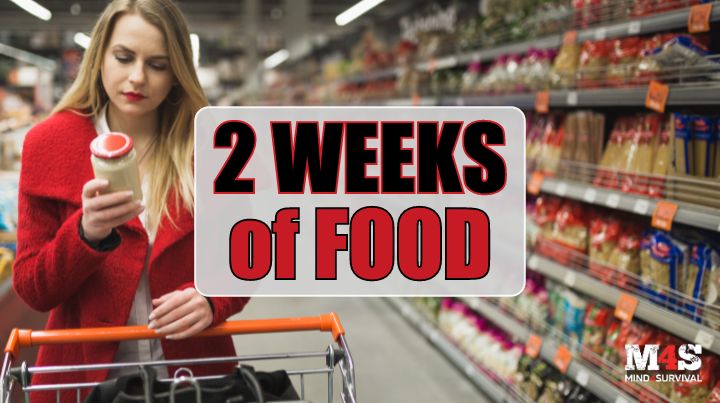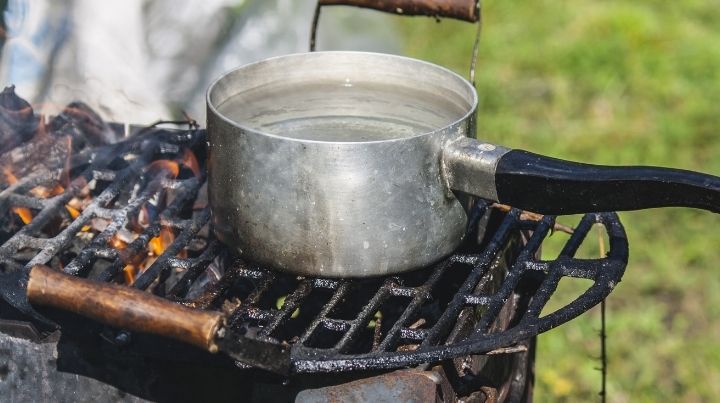2 Weeks of Food: How to Start a Stockpile for New Preppers

When you first start prepping, you probably hear people talking about their “one-year food supply” and “long-term food vs. short-term food.” It can all feel pretty overwhelming and can be difficult to know where to start. The very best way is to start small and simple with a supply of 2 weeks of food.
Now, that may not sound like a lot if you compare it with other preppers who've been at this for years. But consider that the average American makes 1.5 trips to buy groceries per week, and many urban Americans shop almost daily. If you're set on comparing yourself with others, think about how much further ahead your stockpile will be than those who must replenish every few days.
What Questions Should You Ask Before Building Your Stockpile?
It would be nice to give you a tidy list to fulfill on which you could just check off the boxes, but it isn't that simple. There are some questions you should ask yourself before planning your supply of 2 weeks of food.
How many people will you be feeding?
This will help you decide what quantities you need to feed your family for a couple of weeks. Don't forget extended family or friends who may stay with you during a crisis.
Are any of these people on a special diet?
Do any of your family members adhere to a special diet for religious, ethical, or health reasons? Be sure to accommodate their needs when planning your meals. If your daughter is vegan, that can of beef ravioli isn't going to go over too well. Some religions prohibit the consumption of pork and certain seafood. Take all of these things into consideration. Your diabetic family member needs something to eat that isn't loaded with carbs.

Are any of these people picky eaters?
It's easy to say, “If they get hungry enough, they'll eat” when talking about prepping for picky eaters. But in reality, it's not that simple. Do you want to make an already stressful situation even worse by having only foods your finicky loved one hates? It will cause ill feelings on both the cook's side and the one served a portion of food they dislike. Try to find shelf-stable versions of things that choosy family members will eat.
Do any of them have food allergies or intolerances?
It's essential to be aware of allergies and intolerances, particularly during an emergency. Medical help may not be readily available for a severe allergy, making exposure to peanuts or shellfish potentially deadly. For an intolerance, it's less likely to be fatal, but it could be mighty uncomfortable. If someone who avoids gluten or grains suddenly consumes them for three meals a day, they're likely to suffer from some pretty severe gastrointestinal distress. That would be even worse if the toilet won't flush because of the emergency that has you eating from your stockpile.
How do you usually eat? (Healthfully, comfort food, junk food, lots of food?)
The closer you can stick to your regular diet, whatever that might be, the happier and healthier your loved ones will be. Dramatic dietary changes can cause upset stomachs, stubborn mutiny, hunger pangs, cravings, and crankiness. Try to figure out shelf-stable ways to serve family favorites to make mealtime comforting instead of alien, and make sure to have sufficient quantities so that nobody feels deprived.
Do you have a way to cook if the electricity is out?
This is an essential question. Those buckets with a “one-month food supply” require a lot of water and up to 20 minutes of cooking time. The prepper standby of beans and rice can take hours to cook, which is okay in the middle of winter if you already heat with wood. But if you're planning on using a little biomass stove, you'll constantly be feeding a fire for hours to get dried beans tender.
Boiling water is fairly quick and easy in most settings. Foods like rice noodles only need boiling water poured over them and to sit briefly to become ready to eat, and the same is true of instant oatmeal, instant rice, and instant soup mixes. Bulk these up with canned goods to provide a satisfying meal.
But you may not have the means to safely boil water without power, especially if you're a city dweller. In that case, look to foods that don't require cooking at all, like peanut butter and crackers, canned goods, granola bars, and that type of thing.
What Should You Include in Your 2 Weeks of Food?
Please note that the following is just a basic guideline, and quantities are listed per person. You may eat more or less than this. The list assumes you can boil water and heat canned goods. If not, many of these foods can be eaten cold right out of the can – perhaps not ideal, but it will keep you from starving.
Breakfast Foods
- 1 jar of instant coffee per adult (with powdered creamer and sugar)
- 1 pound of powdered milk per person (1 pound of powdered milk makes about 6 and a half cups of milk)
- 1 box of breakfast cereal
- 7 packets of instant oatmeal
- 7 servings of dried fruit
- 12 pack of juice boxes
Lunch and Dinner Foods
- 3 boxes of crackers
- 1 small jar of peanut butter/other nut butter/sunflower butter
- 6 cans of vegetable soup
- 2 cans of chili
- 8 pouches of pre-cooked rice and/or quinoa
- 7 cans of beans
- 4 cans of chicken breast
- 4 cans of tuna
- Shelf-stable travel pouches of mayo
- 7 cans of vegetables
- 7 cans of fruit
- 4 boxes of macaroni and cheese
- 4 cans of pasta (ravioli, spaghetti, etc.)
Treats
Sometimes, a little treat can break up the monotony of shelf-stable eating and lift people's spirits.
- chips
- cookies
- nuts
- trail mix
- candy
- Rice Krispie bars
- granola bars
- popcorn
- s'mores (if you have a campfire)
The Bottom Line on Starting Your Stockpile
Once you have successfully put back two weeks of food, you can rest a little easier and focus on building upon that foundation. You can expand into the other basics of prepping, perform a personal risk assessment, and learn new skills.
Continue to grow your stockpile each week when you shop, even if it's only a couple of canned goods. It all adds up! Figure out some ways that you can cook off-grid, and you'll open up a whole new world of prepper food.
Keep up the great work!
What Would You Include in a Supply of 2 Weeks of Food?
If you were to go to the store right now to build a supply of 2 weeks of food that you could put in the back of the pantry and forget, what would you include? Share your ideas in the comments.
Related Articles
FREE Guide
Read the Best Seller
Join Mind4Survival
Stay informed by joining the Mind4Survival! 100% Secure! 0% Spam!
Affiliate Disclosure...
Mind4Survival is a free, reader-supported information resource. If you make a purchase through our link, we may, at no cost to you, receive an affiliate commission.
Do You Want To Be Ready No Matter What?

Download our free 39-page guide with interactive, 7-Day Emergency Kit Checklist and take the first step toward real preparedness.
- Know exactly where to start.
- Save time and money.
- How-to build a complete Basic Emergency Kit.
- Level up your safety and security.
Join Mind4Survival
Stay informed by joining the Mind4Survival! 100% Secure! 0% Spam!






